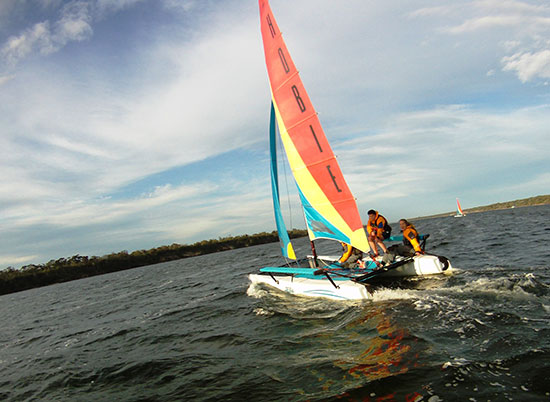
Many of my best lessons, given or gotten, were accidents. Or, more charitably, were improved by accident. I remember leaving Australia for the first time, flying to the USA on what turned out to be Ash Wednesday. As we climbed and banked eastwards into the evening sky, I could see fires far below, and great plumes of smoke rising into a single dark, dreadful wedge. At each airport, news feeds distilled the catastrophe into numbers – houses destroyed, people lost, and dollar costs. Later, shivering in Denver, the local news was of deadly floods and landslides. Wild blizzards outside were closing roads and shutting down settlements. The world seemed awry, and I felt far from home.
Later again, in a class on climate and weather, I learnt what researchers were then discovering about El Niño, a strange weather event that seemed to severely affect both sides of the Pacific. I realised that on Ash Wednesday, my flight had spanned the El Niño extremes. In that 18-hour flight, I had experienced catastrophe at one edge, and disaster at the other. We all enjoyed this class, but for me, this particular insight was visceral. 30 years on, when I think about El Niño, I smell smoke. I am shivering in the snow. I am watching death tolls scroll across TV screens.
Some of my best lessons have been incidental. Once, early on in my teaching life, a group of school families lined up to look at a large sky through a rather small telescope. I launched into what I thought would be a neat little tour of the Milky Way, a crescent moon and a few visible planets. Halfway through, the sky to the south began to glow. It appeared, faded, reappeared. Shafts of light converged into rippling curtains across the sky. None of us had ever seen an aurora. We were gob-smacked. My lesson plan was important – it provided a reason to be out there, looking up, but under that unfolding sky, it was redundant. Time to stand aside and let the universe take over!
Some of my best lessons have been old. Really old. Lighting a fire, catching a fish, finding water – these are lessons that span the whole of human history. After two days in the red rock gorges of Mootwingee National Park, our water bottles are almost empty, thirst begins to hover in our minds, and the bus, with our spare water supply, is a dusty half-day walk away. But the country has a grain, and the grain is expressed in long cracks. Some turn into crevices. Some hold sand, some will even grow small ferns. A precious, hidden few will shelter and preserve deep, dark, shady pools of water. Even after sterilising (feral goats), water will rarely seem sweeter.
Why teach new dogs such old tricks? The search for water requires hope, faith and patience, keen eyes and sweaty effort. Finding water brings immense satisfaction, immediate relief and a validation of so many qualities we want to encourage. Subtly, importantly, it adds yet another layer of contact and connection to this country.
With these stories, I don’t mean to downplay the importance of planning, modern technologies or the control of the classroom. Classroom activity has to be planned, choreographed and coordinated. Good outcomes have to be assured. But our school also makes a distinctive investment in education outside the classroom. Anyone at Clunes or Yiramalay, at any camp or on any tour will have their own stories, their own experiences that may not have been expected, that went beyond, or in very different directions to what had been planned. These are often the experiences we value and remember the most. In my mind, a capacity to encounter and capitalise on the accidental, the incidental and the archetypal opportunities in the real world is one of the ways that we make the difference between a good education and a great one.
